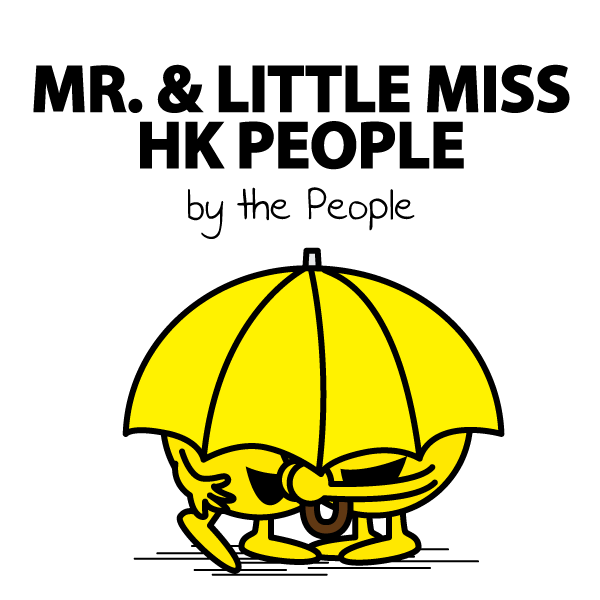Learn Who's Who in Hong Kong's Umbrella Revolution With ‘Mr and Little Miss Hong Kong People’

Ordinary Hong Kong people are protesting for genuine democratic elections of the city's top leader and the Legislative Council. They bring along umbrellas to protect themselves from the police's pepper spray, tear gas and batons. Now, umbrellas have become a symbol representing peaceful protest for Hong Kong democracy.
Many of the images of Hong Kong's Umbrella Revolution have captured large, faceless throngs of protesters standing their ground in the city's financial center to demand free and fair elections from local and Beijing governments. What's been lost in the crowd are the individual leaders and decision makers driving the political tug-of-war.
Hong Kong commercial artist Maxwell spent a night creating a set of cartoon figures called “Mr and Little Miss Hong Kong People” to explain the important figures behind the Umbrella Revolution.
Inspired by British cartoon “Mr Men and Little Miss,” the Hong Kong version means to help parents tell their kids about the protests and let them know what's happening in society. Maxwell believed that regardless of the outcome of the pro-democracy protests, the next generation will benefit from it.
Take a look at the “Mr and Little Miss Hong Kong People” cartoon figures here:
The figure is based on the story of a protester, Mok Siu Man, who started a hunger strike on October 2 and lasted for more than 18 days. He protested with a placard saying, “For the sake of our children, death is not fearful.”
They represent Alex Chow and Lester Shum, two student leaders from the Hong Kong Federation of Students, one of the key organizations behind the massive pro-democracy sit-in.
The figure represents Joshua Wong, the teenage protest leader from high school student activist group, Scholarism. He was arrested on September 26 for trespassing into the civic square in front of government headquarters. The violent clashes between police and student protesters the next day resulted in the arrest of 75 student activists and kickstarted the Occupy Central protests.
This figure represents Regina Ip, a member of the government Executive Council, lawmaker and a former head of the government's Security Bureau. She fully supports the police's violent crackdown on peaceful protesters.
It refers to Steve Hui, the police department's spokesperson. He appeared on TV almost every day at 4 p.m to report on the impact of protests to public order since September 28. As the head of the public relations branch, Hui tries his best to rescue the police officers’ public image. However, what he said has been undermined by viral footage exposing how police abused their power.
The figure refers to Andy Tsang, the head of Hong Kong police force. He is responsible for the unleashing of tear gas on peaceful protesters on September 28. Andy Tsang disappeared for three weeks after the violent crackdown.
The figure represents Yuen Chi Wai, news department chief of Television Broadcast (TVB), the most popular TV station in Hong Kong. Yuen ordered the news team to edit the script of a voice-over on news footage that clearly showed a number of police officers beating up a handcuffed protester in a dark corner near the protest site. According to a leaked voice record of the TV station's news department internal meeting, Yuen criticized his colleagues for being judgmental in the voice-over and said, “You are not the worms inside the police officers, how can you be so sure that the act of punching and kicking are for real?”
The figure represents Lau Kong Wah, former deputy chair of pro-Beijing political party, Democratic Alliance for the Betterment and Progress of Hong Kong (DAB). After he lost his seat in the Legislative Council in the 2012 election, he was appointed by the chief executive as the undersecretary of the Constitutional and Mainland Affairs Bureau. He was responsible for arranging an open dialogue between student leaders and Carrie Lam, the government chief secretary, to resolve the conflict over election reform.
The figure represents Chung Shu Kun, a DAB legislative council member. He has been criticized by netizens for his comments in the Legislative Council. Recently, in order to justify police use of force, he posted an “iron umbrella” on his Facebook and claimed that protesters had inserted blades inside the umbrellas to attack police. Later, a design company issued a public statement expressing regret over Chung's abusive use of their design work — the “iron umbrella” is an art installation to promote recycling design.
Carrie Lam, the chief secretary of Hong Kong government. People believe that she represents the moderate voices in the government as she tries to solve the conflict through open dialogue with the students.
The figure represents Hong Kong Chief Executive C.Y. Leung, who has been depicted by local media as a wolf since he decided to run for the chief executive seat in 2012. Later, people called him 689 because he only managed to obtain 689 votes out of the 1,200 votes in the election committee with the support of the Beijing government. The protesters have refused to have dialogue with Leung as they believe he wants to invite Beijing's direct intervention into Hong Kong affairs by distorting the Umbrella Revolution as a separatist movement and a conspiracy of foreign powers aiming to undermine the Chinese government's authority.
New figures on the Umbrella Revolution continue to be published on Maxwell's Mr. and Little Miss Hong Kong People Facebook page.
Follow our in-depth coverage: Hong Kong's Umbrella Revolution